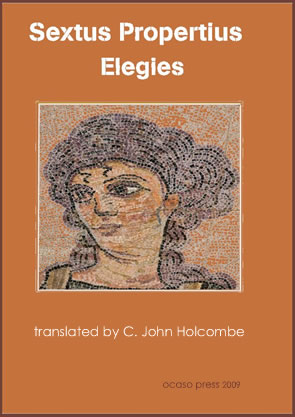Sextus Propertius was born around 50 BC, probably near Assisi in Umbria, and seems to have been dead by 2 BC. His family were well-to-do farmers who lost land after the Perusine War, but neither the confiscation of estates nor the early death of Propertius's father reduced its equestrian standing. Money was found to send the young man to study law in Rome, where he won a literary reputation with startling ease.

His first collection of Elegies was published in 29 or 28 BC, when the poet was still in his early twenties, and brought something new to Latin literature: a slavish subjection to love expressed in vivid elegiac couplets that no one has bettered. Catullus was more intense and personal, but published only short pieces in the metre.
Tibullus was more continuously graceful, but
seems over-refined when set against the turbulent moods that Propertius
depicts in his love affair with Cynthia.
That inspiration we cannot fully know.
Apuleius identified the model with Hostia, a vivacious demi-monde,
which there is no reason to doubt, but Cynthia is also a literary
stalking-horse, a persona Propertius created to explore the many facets
of romantic infatuation. By turns, the lover is tender, ecstatic,
despairing, worldly-wise, self-pitying and importunate. Cynthia is just
as various, everything from the warmed-hearted and cultivated lover to
the calculating hussy. Anyone who has been in love will recognize these
shifting fictions of the heart, which are a tribute to what poets have
created from the emotional turmoil of our lives, and where the Latin
elegists played a large part.
The free Sextus Propertius Elegies e-book is in pdf format and
includes the Latin text, a full glossary, notes on the translation and
references.
Elegy 15: Book Two
O happy me! O night of radiance, and you,
sweet bed that's strewn with such delights!
What declarations when the lamp was lit, what fights
and tussles when the light was doused!
With breasts undone she teased me as we wrestled: then,
with clothes drawn up, she feigned delay.
Her breath fell on my eyelids thick with sleep: she hissed,
'Is this the way you finish, sluggard?'
Such length of arms' embraces as we changed positions,
kisses lengthening on the lips!
No pleasure comes from sightless acts, and you must know
that eyes go forward in desire,
as Paris found who met the Spartan naked, coming
from the bed of Menelaus,
as splendidly undone was chaste Diana, where
Endymion as naked lay.
So do not come to bed still wearing clothes, or my
delirious hands will rip them off.
Avoid the further angering me, or your bruised arms
will bear their witness to your mother.
Allow no loosened breasts prevent our playing, look
for shame to those who've given birth.
Let's feast our eyes with lover's scenes: for days bring on
the night from which no day returns,
and pray that we ever are like this, bound in chains
that none at daybreak can undo,
and close as murmuring doves are, that is man and woman,
one and so completely joined.
Who looks for limit to love's madness finds no end,
for love will never have enough.
And sooner earth betray the farmer with false crops,
or jet-black horses draw the sun,
or streams call waters back to source, or deeps dry up
and leave their fish in cindery earth,
than I should think to loan my love-pains to another:
hers in life, and in my death.
Grant she give me such a few more times: a year
with these would serve me for a life.
Grant she give me many of such nights, from each
I am more godlike than before.
Grant that everyone so run through life, their limbs
be weighted down as though with wine —
there'd be no blows from daggers, nor from ships of war
would bones be tossed to Actium's deeps,
nor Rome attacked by its own triumphs, shown forever
grieving with its hair undone.
Posterity would surely raise their cups to us
who did not injure any gods.
You give, in glory of our loving, all your kisses,
yet those kisses are but few.
As petals wither from the garlands, fall in cups
and drift at loss there listlessly,
so we, who fill ourselves with lovers' breath, may find
tomorrow’s day shut in by fate.